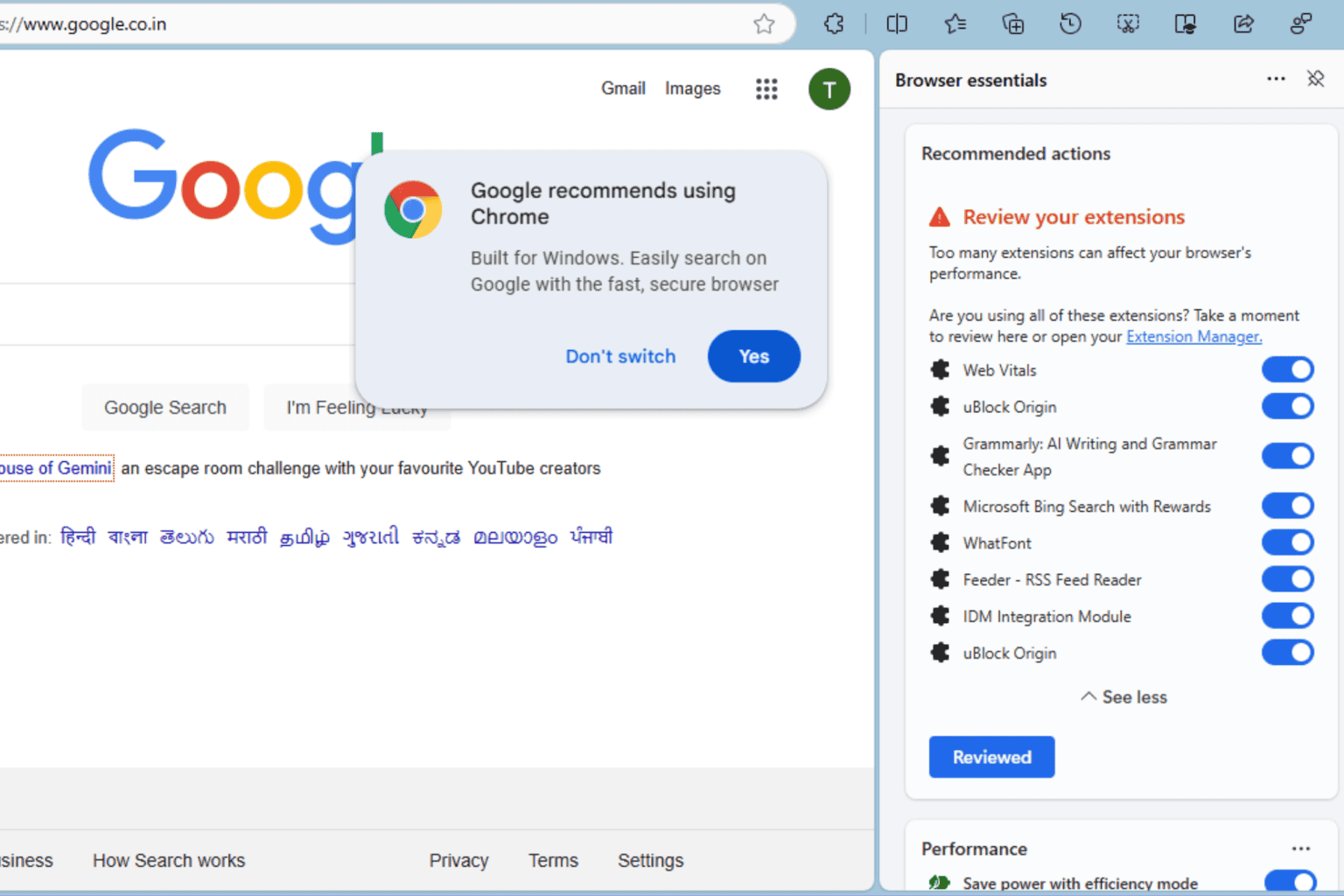Microsoft Warns Windows Users—Change Your Browser As New Attacks Underway
Listen up, Windows users! Microsoft is sounding the alarm bells, and this time, it's serious. If you're still using an outdated browser, you might be putting yourself at risk. New attacks are underway, and they're targeting vulnerabilities that many users aren’t even aware of. In today’s digital age, staying safe online isn’t just a suggestion—it’s a necessity. Let’s dive into what’s happening and why switching browsers could save your skin.
Imagine this: you’re cruising through your favorite websites, streaming videos, and checking emails when suddenly—bam! Your computer gets hit by a malicious attack. It sounds like something out of a movie, but it’s a very real possibility if you’re using outdated software. Microsoft has issued a warning to Windows users about new threats lurking in the cyber shadows. These attacks exploit weaknesses in older browsers, making them prime targets for hackers.
Now, before we go any further, let’s get one thing straight. This isn’t just some random scare tactic. Microsoft is a global tech giant with a vested interest in keeping its users safe. When they say there’s trouble brewing, you better believe it. So buckle up, because we’re about to break down everything you need to know about these new threats and how you can protect yourself.
What’s the Big Deal About These New Attacks?
Here’s the lowdown: cybercriminals are getting smarter, and their methods are evolving faster than ever. The latest wave of attacks targets vulnerabilities in older versions of Internet Explorer and other outdated browsers. These browsers lack the security features and updates that modern alternatives offer, making them sitting ducks for hackers.
Think of it like driving an old car without seatbelts or airbags. Sure, it’ll get you from point A to point B, but if you crash, you’re in big trouble. Similarly, using an outdated browser might seem harmless, but it’s a recipe for disaster in today’s digital landscape.
Why Are Outdated Browsers So Vulnerable?
- Older browsers often lack regular security updates.
- They don’t support the latest encryption protocols.
- Many have known vulnerabilities that hackers exploit.
- They’re not optimized for modern web standards.
Let’s take Internet Explorer as an example. Once the king of browsers, it’s now more of a relic. Microsoft itself has urged users to ditch IE in favor of Edge, its newer, more secure alternative. But despite the warnings, millions of users are still clinging to IE, putting themselves at risk.
How Can You Protect Yourself?
The good news is, protecting yourself is easier than you think. Here’s what you need to do:
Switch to a Modern Browser
Modern browsers like Microsoft Edge, Google Chrome, Mozilla Firefox, and Apple Safari come packed with cutting-edge security features. They’re designed to keep you safe from the latest threats while offering a smoother browsing experience.
For instance, Microsoft Edge includes features like:
- Microsoft Defender SmartScreen: Blocks phishing and malware sites.
- Enhanced Tracking Protection: Keeps advertisers and trackers at bay.
- Regular Security Updates: Ensures you’re always protected against new threats.
Keep Your Software Up to Date
It’s not enough to switch browsers—you also need to keep your software up to date. Regular updates patch vulnerabilities and add new security features, so don’t ignore those pesky update notifications.
Pro tip: Enable automatic updates to ensure you never miss a critical patch.
Understanding the Threat Landscape
Cyberattacks are becoming more sophisticated, and the stakes are higher than ever. Here’s a quick rundown of the most common types of attacks:
Phishing Attacks
Phishing scams trick users into giving away sensitive information, like passwords and credit card numbers. Hackers often use fake emails or websites to lure victims into their traps.
Malware Infections
Malware, short for malicious software, can wreak havoc on your system. It can steal your data, corrupt your files, or even turn your computer into a zombie in a botnet.
Ransomware
Ransomware encrypts your files and demands a ransom for their release. Paying the ransom doesn’t guarantee you’ll get your data back, so prevention is key.
Why Should You Trust Microsoft’s Warning?
Microsoft isn’t just blowing smoke here. As one of the largest tech companies in the world, they have a vested interest in keeping their users safe. Their security team is constantly monitoring the threat landscape and issuing updates to protect against emerging risks.
Plus, Microsoft has a track record of delivering reliable security solutions. From Windows Defender to Azure Security Center, they’ve built a robust ecosystem of tools designed to keep users safe.
Microsoft’s Commitment to Security
Here are a few reasons why you can trust Microsoft’s warning:
- They invest billions in cybersecurity research and development.
- They partner with leading security firms to stay ahead of threats.
- They provide free security tools and resources for users.
What Are the Benefits of Switching Browsers?
Switching to a modern browser isn’t just about staying safe—it’s also about improving your overall browsing experience. Here’s what you stand to gain:
Speed and Performance
Modern browsers are faster and more efficient than their outdated counterparts. They load pages quicker, handle multiple tabs with ease, and consume less system resources.
Security and Privacy
As we’ve already discussed, modern browsers come with advanced security features that protect you from a wide range of threats. They also offer better privacy controls, allowing you to manage your data and block trackers.
Compatibility
Modern browsers support the latest web standards, ensuring that you can access all your favorite sites and services without issues. No more broken layouts or missing features.
Real-World Examples of Browser-Related Attacks
Don’t think browser-related attacks are just theoretical? Think again. Here are a few real-world examples:
The Internet Explorer Zero-Day Vulnerability
In 2021, a zero-day vulnerability in Internet Explorer allowed hackers to remotely execute code on affected systems. This meant they could take full control of a victim’s computer without their knowledge.
The Firefox Cross-Site Scripting Flaw
Even modern browsers aren’t immune to vulnerabilities. In 2020, a cross-site scripting flaw in Firefox allowed attackers to inject malicious scripts into web pages. Mozilla quickly patched the issue, but it highlights the importance of keeping your browser up to date.
How to Stay Safe Online
Switching browsers is just the first step in staying safe online. Here are a few additional tips:
- Use strong, unique passwords for all your accounts.
- Enable two-factor authentication wherever possible.
- Be cautious when clicking links or downloading attachments.
- Regularly back up your important data.
Conclusion
Microsoft’s warning to Windows users is a wake-up call. If you’re still using an outdated browser, now’s the time to make the switch. New attacks are underway, and they’re targeting vulnerabilities that many users aren’t even aware of. By upgrading to a modern browser and following best security practices, you can protect yourself from these threats.
So what are you waiting for? Take action today and make your online experience safer, faster, and more enjoyable. And don’t forget to share this article with your friends and family. After all, staying safe online is a team effort.
Table of Contents
- What’s the Big Deal About These New Attacks?
- Why Are Outdated Browsers So Vulnerable?
- How Can You Protect Yourself?
- Understanding the Threat Landscape
- Why Should You Trust Microsoft’s Warning?
- What Are the Benefits of Switching Browsers?
- Real-World Examples of Browser-Related Attacks
- How to Stay Safe Online
- Conclusion
Bucks News: Kyle Kuzma Doubles Down On Decision To Veto Trade To Mavericks
Universities Facing 'Impossible Situation' As Trump Administration Cracks Down On DEI: Report
33 Immortals - Official Launch Trailer: The Ultimate Guide To The Game's Debut

Microsoft Warns Windows Users—Change Your Browser As New Attacks Underway

Microsoft Warns of Attacks on Windows MSHTML Zero Day Decipher

Microsoft Edge's new feature warns if Extensions drain browser